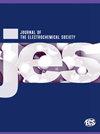生物基聚合物掺氮碳上的 CoFe2O4 纳米粒子作为锂空气电池的双功能电催化剂
IF 3.3
4区 工程技术
Q2 ELECTROCHEMISTRY
引用次数: 0
摘要
锂空气电池(LABs)作为一种前景广阔的储能解决方案正日益受到关注。其理论能量密度为 3,505 Whkg-1,超过了传统的锂离子电池(500-800 Whkg-1)。锂空气电池的商业可行性和广泛应用面临着各种挑战,如循环稳定性差、寿命有限以及副反应尚未解决。在本研究中,我们合成了装饰在生物基聚(2,5-苯并咪唑)衍生的掺杂 N 的碳上的尖晶石 CoFe2O4 作为电催化剂。值得注意的是,通过各种表征观察到了强烈的金属-基底相互作用(SMSI)。在 200 mAg-1 的电流密度下,LAB 的放电容量高达 18,356 mAhg-1,即使在 400 mAg-1 的高电流密度下循环 200 次,也能保持 1,000 mAhg-1 的显著放电容量。在生物萃取的 ABPBI 上装饰 CoFe2O4,有望成为高容量可充电 LAB 的实用呼吸空气电极。本文章由计算机程序翻译,如有差异,请以英文原文为准。
CoFe2O4 Nanoparticles on Bio-Based Polymer Derived Nitrogen Doped Carbon as Bifunctional Electrocatalyst for Li-Air Battery
Lithium-air batteries (LABs) are gaining attention as a promising energy storage solution. Their theoretical energy density of 3,505 Whkg−1 exceeds that of conventional lithium-ion batteries (500–800 Whkg−1). The commercial viability and widespread adoption of lithium-air batteries face challenges such as poor cycling stability, limited lifespan, and unresolved side reactions. In this study, we synthesized spinel CoFe2O4-decorated on bio-based poly(2,5-benzimidazole) derived N-doped carbon for electrocatalysts. Notably, strong metal-substrate interaction (SMSI) was observed through various characterizations. The bifunctional electrocatalytic activity and stability toward oxygen reduction reaction and oxygen evolution reaction were significantly enhanced by the SMSI, The LAB demonstrated a high discharge capacity of 18,356 mAhg−1 at a current density of 200 mAg−1, maintaining a remarkable discharge capacity of 1,000 mAhg−1 even at a high current density of 400 mAg−1 for 200 cycles. CoFe2O4-decorated on bio-derived ABPBI holds promise as a practical air-breathing electrode for high-capacity rechargeable LABs.
求助全文
通过发布文献求助,成功后即可免费获取论文全文。
去求助
来源期刊
CiteScore
7.20
自引率
12.80%
发文量
1369
审稿时长
1.5 months
期刊介绍:
The Journal of The Electrochemical Society (JES) is the leader in the field of solid-state and electrochemical science and technology. This peer-reviewed journal publishes an average of 450 pages of 70 articles each month. Articles are posted online, with a monthly paper edition following electronic publication. The ECS membership benefits package includes access to the electronic edition of this journal.

 求助内容:
求助内容: 应助结果提醒方式:
应助结果提醒方式:


